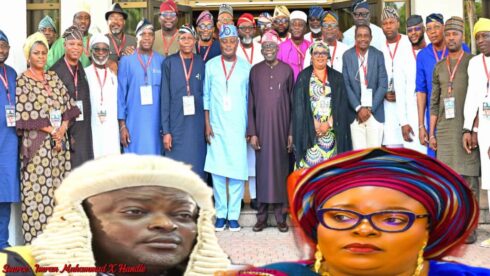Ali Ndume, Senator for Borno South, has called on President Bola Tinubu to dismiss underperforming ministers from his cabinet. According to Ali Ndume, some ministers are not meeting the standards expected of them, hindering the government’s ability to achieve its objectives. Ali Ndume’s statement was released in Abuja on Saturday, following recent cabinet changes initiated by President Tinubu.
The lawmaker’s comments reflect growing concerns over the effectiveness of Tinubu’s administration.Ali Ndume praised the President’s decision to restructure the cabinet last week but emphasized that more adjustments are needed to enhance efficiency. His appeal underscores the importance of continuous assessment and accountability within Tinubu’s government.
Tinubu’s Cabinet Reshuffle Receives Mixed Reactions from Lawmakers
Ali Ndume applauded Tinubu’s recent cabinet reshuffle as a “masterstroke,” acknowledging the efforts to optimize the government’s operations. This reshuffle included the creation of the Ministry of Regional Development, a strategic move aimed at enhancing regional governance and addressing specific local issues across Nigeria’s diverse regions. Lawmakers and political analysts have expressed mixed views, with some seeing it as a step forward, while others remain critical of its timing and scope.
The Ministry of Regional Development is now tasked with managing all regional commissions, a responsibility previously scattered across different ministries. Supporters argue that this consolidation can lead to better regional oversight, while critics question the need for a new ministry amidst calls for reduced governance costs. Ali Ndume’s approval signifies his belief in the reshuffle’s potential but emphasizes further changes to eliminate inefficiencies.
The Case for Performance-Based Appointments in Tinubu’s Administration
Ali Ndume’s remarks highlight a growing sentiment among Nigerians for performance-based accountability within the cabinet. He criticized certain ministers for being “missing in action,” suggesting that their contributions have fallen short of expectations. This call for dismissals reflects a shift toward meritocracy in Nigerian politics, where government officials are expected to justify their positions through tangible achievements.
Performance-based appointments could serve as a blueprint for other leaders, marking a departure from the traditional loyalty-based system. Such an approach aligns with Tinubu’s stated commitment to transparency and governance efficiency, fostering an environment where only effective ministers retain their roles. This demand for accountability underscores the desire for a results-oriented administration that prioritizes national progress over political allegiances.
Ministry of Regional Development: A Strategic Move or Additional Expense?
The creation of the Ministry of Regional Development has sparked debate over its impact on Nigeria’s governance. Ali Ndume expressed his satisfaction with the ministry’s establishment, stating that it exemplifies Tinubu’s dedication to addressing regional challenges. The ministry is anticipated to coordinate efforts across Nigeria’s regions, ensuring that local needs receive targeted solutions through efficient oversight.
However, some critics argue that adding another ministry may contradict Tinubu’s objective of reducing government costs. While supporters believe it could streamline processes by consolidating regional oversight, opponents fear it could become another bureaucratic layer. Ali Ndume’s endorsement, however, signals a belief in the ministry’s value in achieving balanced regional development and tackling long-standing local issues.
The Push for Streamlining Ministries to Reduce Governance Costs
A central theme in Ali Ndume’s statement was President Tinubu’s commitment to reducing the cost of governance, which includes minimizing the number of ministries. Streamlining ministries is seen as a vital step towards efficient government spending, which could free up resources for critical development projects. This goal aligns with Ali Ndume’s call for the removal of underperforming ministers, emphasizing the importance of a lean, productive government structure.
Tinubu’s decision to consolidate ministries reflects a response to public calls for fiscal responsibility. By focusing on only essential ministries and eliminating redundant roles, the administration aims to allocate funds more effectively. Ali Ndume’s remarks highlight his alignment with this objective, advocating for a government that prioritizes effectiveness while minimizing wasteful expenditure.
Future Prospects: Could More Dismissals Reshape Tinubu’s Cabinet?
Ali Ndume’s suggestions raise questions about the future composition of Tinubu’s cabinet. As pressure mounts to ensure that only high-performing ministers retain their positions, additional dismissals could become a reality. Such changes might signal a more adaptive governance style, where the cabinet evolves based on performance and effectiveness rather than political loyalty.
With Tinubu already demonstrating a willingness to reconfigure his team, future adjustments could follow if ministers fail to meet performance benchmarks. This dynamic approach, supported by figures like Ali Ndume, could drive more targeted reforms and enhance governance, aligning with public expectations for a government that is both efficient and accountable.
Table of Contents
Discover more from OGM News NG
Subscribe to get the latest posts sent to your email.














